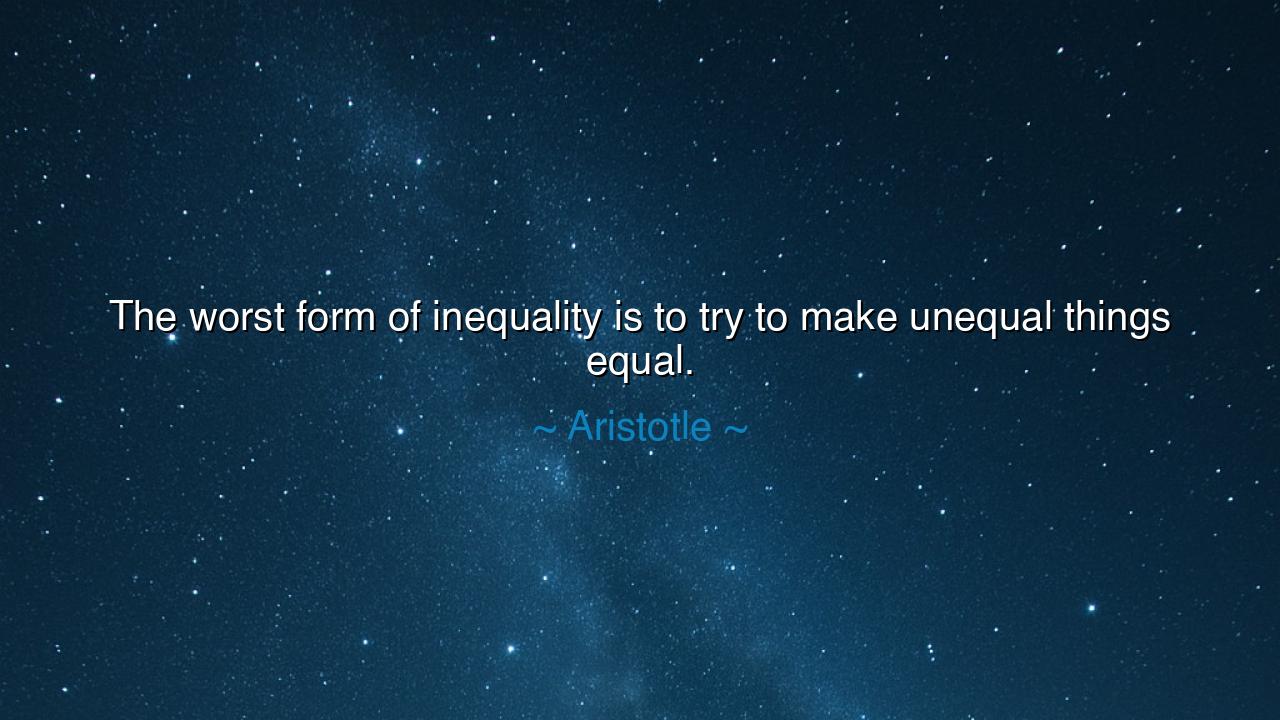
The worst form of inequality is to try to make unequal things






“The worst form of inequality is to try to make unequal things equal.” Thus spoke Aristotle, the philosopher of balance, justice, and reason. His words, though born more than two millennia ago, still burn with the clarity of eternal truth. In them lies a lesson that the wise have pondered since the dawn of thought—that equality, noble as it is, must walk hand in hand with justice. For when we ignore the natural differences among things—between strength and weakness, wisdom and folly, virtue and vice—we do not create harmony but distortion. The equality that denies truth becomes not fairness, but tyranny disguised in noble form.
To understand Aristotle’s wisdom, we must remember the world in which he lived—a time when the great minds of Greece sought to define the very order of nature. To him, justice was not the equal sharing of all things, but the giving of what is due to each according to merit, effort, and purpose. He observed that no tree grows the same, no star shines with equal light, and no man walks the same path of destiny. Thus, when societies force sameness where nature has sown difference, they destroy the balance of the world. True justice, he said, lies not in treating all men the same, but in treating each man rightly.
The ancients called this the “harmony of order.” A symphony requires not that every instrument play the same note, but that each play its part with precision. When the flute is forced to sound like the drum, the music is lost. So too in human affairs—when talent is ignored, when effort is scorned, when excellence is punished for the sake of false equality, society falls into discord. Aristotle’s warning was not against compassion, but against confusion—the belief that fairness is sameness. In his eyes, the worst injustice is to strip virtue of its reward and give honor where it is unearned.
Consider the tale of the French Revolution, where the cry for equality thundered through the streets of Paris. The people, long oppressed, rose in righteous anger—but their vision turned blind when equality became their only god. In their zeal to make all men the same, they struck down the wise and the noble alongside the cruel and corrupt. The guillotine, meant to serve justice, became a symbol of chaos. In seeking to make unequal things equal, they destroyed what was good as well as what was evil. Thus, Aristotle’s prophecy came to life: the worst inequality is not found in difference, but in the denial of difference.
Yet Aristotle’s teaching need not be read as cold or cruel. His was not a call to pride, but to wisdom. For difference does not mean superiority—it means diversity of purpose. The farmer, the poet, the soldier, and the philosopher each serve the common good in their own way. To treat them as the same is to dishonor their uniqueness. True equality is born when each person is valued for their role, not when all roles are flattened into one. The river does not envy the mountain; the mountain does not seek to flow. Each fulfills its nature, and in doing so, the world remains whole.
Aristotle’s words also speak to the heart of our own age, where the desire for fairness can sometimes blind us to reality. We confuse compassion with sameness, believing that to love others means to deny distinction. But love does not erase difference—it celebrates it. The wise ruler does not make all men equal by force, but creates a world where all may rise according to their gifts. Justice is not giving everyone the same reward, but giving each the opportunity to earn what they deserve. Equality of opportunity, not equality of outcome, is the soil in which both dignity and excellence grow.
The lesson, then, is as enduring as the stars: do not seek false equality, but true justice. Treat every person with respect, but also with discernment. Recognize strength where it shines, and nurture it. Protect weakness not by pretending it is strength, but by guiding it toward growth. A society that honors merit will rise; one that levels all to mediocrity will fall. Each soul must be measured not by another’s scale, but by its own capacity for virtue and truth.
So remember the wisdom of Aristotle, children of the future: the world’s beauty lies in its differences. The task of the just is not to erase them, but to weave them into harmony. Equality without truth is a shadow of justice; justice without compassion is its corpse. Let your heart, therefore, be both fair and wise—seeing each person as they are, honoring their gifts, and giving to each what is rightly theirs. For in that balance, the soul finds peace, and humanity finds its highest order.






AAdministratorAdministrator
Welcome, honored guests. Please leave a comment, we will respond soon